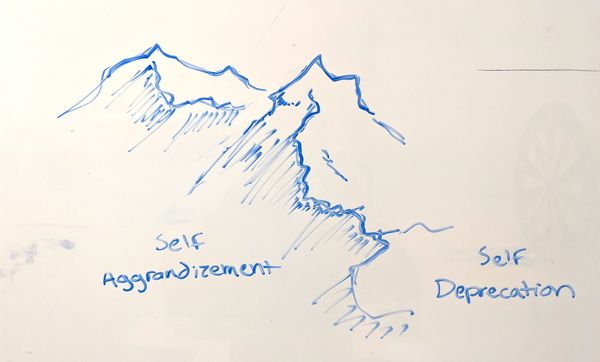At Deep Space Robots we have three principles that define the way we approach our work: Happy, Humble, and Hungry. Today we’re going to take a quick look at “Humble”. Humility is almost universally recognized as a fundamental element of moral conduct. Philosophers and theologians from Confucius to St. Augustine have articulated some version of: “Humility is the foundation of all virtues”. Despite this recognition, humility is an incredibly unnatural condition. So much so, that even our attempts to define it often result in its corruption, leaving us with a counterfeit virtue.
Humility is not...
It’s often useful to understand a given virtue in the context of its opposite condition. Aaron recently wrote about how we hold happiness in the hollow carved out by sadness; the larger the void, the greater our capacity. In the same way, humility must be understood opposite of pride. We can easily conceptualize pride as self-aggrandizement, and the most common understanding of humility operates on this assumption.
The definition of humility I heard most often growing up went something like this: “Being humble means valuing other people and their needs more than your own.” This is a handy little heuristic, but it’s wrong; or at best a half-truth. If my practice of humility depends on me continually evaluating my needs and value relative to another’s, I can remain comfortably self-absorbed while I pursue humility. This usually plays out something like this: I make an honest effort to consider other people as more valuable than me, but sooner or later I bump into someone who is less skilled/kind/hard-working/etc than me. I try unsuccessfully to convince myself that I am less important than this person, I recognize my pride, and it makes me feel guilty, so I indulge in a little self-deprecation to try and even the score. Riding this pendulum allows me to believe I’m striving for humility while still remaining 100% preoccupied with myself, that is to say, 100% prideful.
Pride is self-absorption, whether self-aggrandizing or self-deprecating. Humility is the opposite: a rigorous orientation away from self, toward others.
Humility is affirmative, not comparative.
Being humble means considering each person’s inherent value and treating them in a way that affirms that value. A person’s value is not contingent on their characteristics, beliefs, capabilities, or potential, but rather on their very existence as a person. Stated in the negative, being humble means refusing to devalue another person based on their characteristics, beliefs, capabilities, or potential. Being humble is not a comparative race to the bottom, rather, it is a conscious orientation away from self, toward others. This diligent preoccupation with the value of others is what sets true humility apart from the self-absorption of comparing another’s value to your own, and imagining yours to be lesser.
Humility is a discipline, not a destination.
When I’m trying to improve myself in some way, it’s easy for me to imagine myself progressing along the spectrum toward the virtue I want to achieve, away from the vice I want to avoid. While this is in some sense accurate, it’s a problematic conceptualization because it portrays the virtue as an endpoint – something fixed that I have either attained or not. I think a better way to understand the pursuit of virtue (humility in particular) is as a discipline. I am humble when I am making a continual dedicated practice of considering and affirming the value of the people I interact with.
I love alpine hiking, so I’m going to pull from that experience to form a better metaphor. Imagine you are hiking along an exposed ridge in a high mountain range. To your left the is a 400m exposure (sheer drop), and to your right, a 600m exposure. You must apply continual attention and effort to keep your footing along the ridge or you will slip off one direction or the other.

That’s what growing in humility is like; it’s not a moment in time when you are finally perfectly humble, it’s a continual discipline that keeps you firmly oriented toward others, and prevents you from slipping into self-aggrandizement, or self-deprecation.
Humility transforms your personal and professional interactions.
If you’ve been skimming up to this point looking for the action items, go back and read the beginning. Forcing beneficial behaviors does not make you a humble person; don’t confuse the ends with the means. When you foster an attitude of humility, considering each person’s inherent value and treating them in a way that affirms that value, how you treat people will change.
As I interact with other professionals, I often rub shoulders with people who are far more proficient/skilled/talented than I am. Being humble means I consider the personal value of these people. I refuse the insistent urge to be intimidated by their prowess, or the desire to see them only as a resource I can leverage to develop myself in some way. Inevitably, I also run into people that are demonstrably less proficient/skilled/talented than I am. In this case, being humble means that I refuse to devalue them based on their characteristics, or view them as a project to be fixed or managed. I appreciate, and affirm their personal value outside of how they compare to me, or what I can gain from them. In both cases, I do my best to judge what actions will best communicate their value. Sometimes it’s kind words to encourage, sometimes it’s a clear, honest apology to make up for a failure, sometimes it’s good-natured ribbing to make someone feel part of the team, sometimes a fist-bump, high five, a hug, or a hearty handshake. Often it’s just listening intently, really trying to understand. If you have trouble making these judgements it’s ok to just come out and ask: “What’s the best way I can show that I value you?”.
I’d like to close with a quote from C.S. Lewis that beautifully captures what it means to be a humble person:
Do not imagine that if you meet a really humble man he will be what most people call ‘humble’ nowadays: he will not be a sort of greasy, smarmy person, who is always telling you that, of course, he is nobody. Probably all you will think about him is that he seemed a cheerful, intelligent chap who took a real interest in what you said to him... He will not be thinking about humility: he will not be thinking about himself at all.

